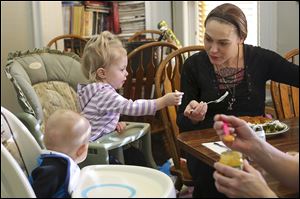
Toledo, nonprofit groups concerned about cuts
Trump’s plan would end grant program
3/17/2017Michael Marsh knows the current federal budget proposal from President Trump would do damage to the Toledo Fair Housing Center.
“He’s trying to create a new budget and, at the same time, he’s trying to undermine fair housing,” the center’s president and chief executive officer said.

Tiffanie Howell feeds her 15-month-old daughter Kensingtyn at the Aurora Project Inc. house in Toledo. Aurora Project gets $76,296 in federal block grant funds.
The organization receives 20 percent of its funding through the Community Development Block Grant, a decades-old program that would be eliminated if Mr. Trump’s proposal is adopted.
“It would limit our ability to provide essential services to people experiencing discrimination in housing,” Mr. Marsh said, since the diminished funding would force staff cuts.
The city of Toledo contributed $150,000 to the agency this fiscal year, out of the $6,775,950 it received from the Department of Housing and Urban Development. The Republican president’s budget proposal would cut $6.2 billion in HUD funding, $3 billion of which comes from eliminating the block grant program.
Toledo Mayor Paula Hicks-Hudson was critical of the proposal during a Wednesday news conference with local CDBG-funded agency leaders.
“CDBG funds strengthen our economic vitality and it helps us to eliminate blight, which is our top priority,” the mayor, a Democrat, said.
Mr. Trump’s budget places community and economic development funding responsibility on state and local governments.
“The Federal Government has spent over $150 billion on this block grant since its inception in 1974, but the program is not well-targeted to the poorest populations and has not demonstrated results,” Mr. Trump’s budget proposal reads.
RELATED CONTENT: 2016-17 Community Development Block Grant funding list | 2012-17 City of Toledo CDBG funding allocations
The city distributes some of the money it receives from HUD to 31 nonprofits in Toledo, as well as funding some administrative positions within the government.
A report on the 2017 city budget prepared in December for Toledo City Council by City Auditor Jake Jaksetic states the city uses $3.1 million of CDBG money to pay for 58 full-time-equivalent positions.
The Hicks-Hudson administration could not immediately provide a list of CDBG-funded employees and their salaries.
Councilman Tom Waniewski, a Republican, said he anticipated the President would make such cuts to CDBG.
“CDBG provides a lot of money to the city, does wonderful things,” Mr. Waniewski said. “Hopefully, the next step to is get our administrators together on how they will operate in light of pending cuts. I have had a problem with funding city administrators with CDBG, so maybe this is a good kick in the pants.”
Bonita Bonds, the city’s neighborhoods director, said the money is spent on things such as senior-homes repairs and rodent abatement.
“Safe, decent, affordable housing,” Ms. Bonds said. “Without these dollars some people wouldn’t have that. ... Our seniors, this time of year, may not have a furnace, may not have a roof. These dollars help people stay in their homes.”
Legal Aid of Western Ohio, which received $45,235 in CDBG funds from the city to provide legal assistance for low-income people in eviction or foreclosure cases, could lose more than half of its $6 million annual funding under this proposed budget. It receives $3.1 million in federal funding from the Legal Services Corp., an agency Mr. Trump’s proposal also would eliminate.
“It means fewer folks are receiving our services,” LAWO Executive Director Kevin Mulder said. The organization, which operates in 32 northwest and west central Ohio counties, also helps domestic violence victims acquire civil protection orders and low-income individuals get government aid.
“These are issues where a person’s basic needs are at stake,” Mr. Mulder said.
Denise Fox, the executive director of the Aurora Project, is still reeling from $100,000 in HUD funding losses in July. The current budget proposal would cost the organization another $76,296 in funding, about 10 percent of its annual budget, and Ms. Fox is not sure how she would fill that gap.
“It may mean getting smaller,” she said. “It usually means serving fewer people.”
The CDBG funds went solely to the organization’s transitional housing, which temporarily houses more than 50 women and 55 children who were struggling with homelessness.
“This is the only place they can go in northwest Ohio and southeast Michigan where families can stay together while we work on those issues,” Ms. Fox said.
The organization also offers long-term housing for up to two years, which includes partnering with many other local agencies to help families for life after the shelter. That puts Ms. Fox in touch with many other agencies facing potential funding cuts.
“This is not just our agency,” she said. “This is also our community.”
The city’s largest family homeless shelter, Family House, would lose $59,716 in CDBG funding, about 12 percent of its annual budget, which goes toward the case managers who help address what causes individuals to end up homeless.
“It’s very hard to fund human capital,” Family House Executive Director Renee Palacios said. She described the two case managers employed at the organization as essential to its mission.
“It’s not about people losing their jobs,” she said. “Case managers are the program.”
The more than $6 billion in cuts at the Department of Housing and Urban Development that would slash things like public housing support across the nation are part of President Trump’s goal to cut domestic spending by $54 billion to increase the United States’ defense spending by $52.3 billion.
The proposal would reduce the federal discretionary budget by $13.6 billion. This budget proposal is for fiscal year 2018, which starts this October.
Contact Zack Lemon at: zlemon@theblade.com, 419-724-6282, or on Twitter @zack_lemon.